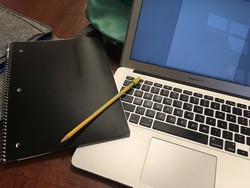A laptop is a must-have for all college students; University websites will even give guidelines to what kind of laptops should be purchased. In other words, colleges rely on our ability to have access to technology.
But, this is not a bad thing at all. After all, the internet is chock full of information and as students, we have access to virtually anything at the touch of our hands and the connection to Wi-Fi. Note-taking is quicker and we can make it all neat with just some format adjustments. However, laptops might not be the best way to take notes.
The University as a whole has split opinions on whether it is more beneficial to take notes on a laptop or with pen and paper.
Laptops: many professors will advise against it, some are preforming research on it, and others think it is valuable to have information at students’ finger tips. Frank Fury, Ph.D., professor of English, often lets students have laptops in his classes.
“I think that they can be a distraction sometimes, but it is less about note-taking and more about being a supplement to discussions,” Fury stated.
The old school way to take notes is via pen (or pencil) and paper. Laptops may make note-taking faster, but there is not as much knowledge retention in taking notes with a keyboard.
Physically writing down your notes will spark a mental process that helps you to remember what you have written down. That is why a lot of professors, especially in note-dependent classes, will often advise that laptops are to remain shut.
It is not unlikely that some students will keep the old way of taking notes just because they think it works better. Josie Gargiulo, a sophomore English and education student, said, “I prefer to write down my notes. I even draw little pictures to help me remember it all better.” The pictures provide visual cues for her mind to remember the information.
Aside from retention, students who use laptops tend to over-write information that might not be relevant. The speed of typing may also cause you to write down the lecture word for word, rather than in your own words.
If you return to your notes later on, try and rewrite your notes in your own words, either on that page or in a fresh document. When you look back on your notes, you will be under less pressure and in a more comfortable setting. This will allow you to absorb the information that you wrote down.
Some professors outright ban laptops because they are a distraction to students. Many think that the laptops give the student a wall between them and the lecture. The content available on your screen may distract you from class, and cause you to miss some important information. Professors think that students would be tempted to exit out of their document and shop online or message friends on social media.
Brittany Leventoff, a sophomore finance student, said, “Laptops in class are very beneficial because many students type faster than they can write. It also gives quick access to look up anything they do not know to further their understanding of the topic being discussed.”
Either option is a double-edged sword, but it really comes down to the person who wields the weapon. If you decide to use the laptop correctly, it is really beneficial to you, especially if you like easy organization. If you are able to write everything down quickly without missing important lecture notes, pen and paper might be better.
The best way to take notes might just be to use the best of both techniques. That is, writing the notes on the laptop and then recopying them on a hard copy or vice versa. That way, the information is retained twice by using both types of techniques. Try out both techniques to figure out which one works the best for you.
PHOTO TAKEN by Skylar Daley




